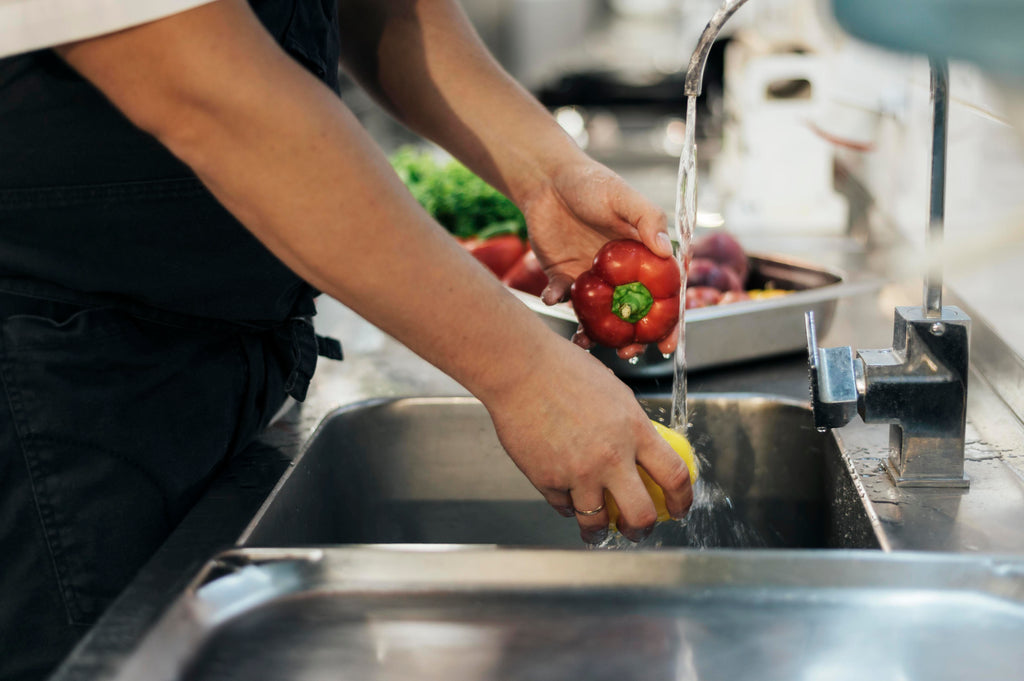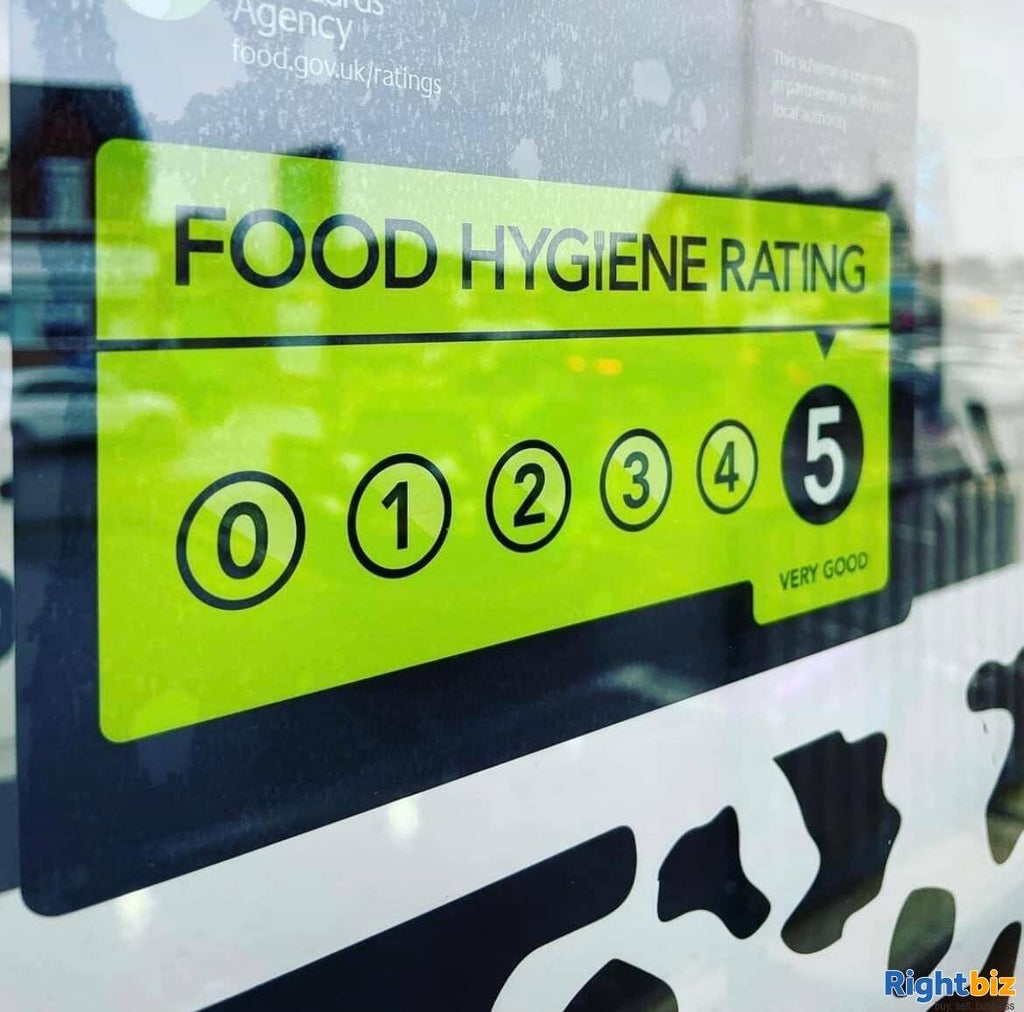How To Improve Your Food Hygiene Rating

There are many aspects to focus on when running a food takeaway business, but possibly the most important aspect is the business’s hygiene practices. If the level of cleanliness in the establishment is not to a high standard, then a food business may be served a Food Hygiene Improvement Notice.
Later in this blog, we will explain what a Food Hygiene Improvement Notice is. For now, let’s go through what food hygiene is and why it is important to maintain a high standard within a food business.
Food hygiene refers to how food is stored, handled, prepared, and cooked before it reaches customers. This is to ensure that the food is safe to consume as well as to give people the confidence that they know what they are eating.
If you run a food business, such as a takeaway, it is important to maintain high levels of cleanliness to help prevent bacteria from spreading and the likelihood of your customers becoming ill.
For example, E. Coli is a type of bacteria that can spread easily in a kitchen. It can spread when the utensils are not cleaned properly after cutting raw beef, which can lead to food being contaminated. If a person eats contaminated food, this can result in them suffering from serious food poisoning.
Not only will carrying out tasks to a high standard help to ensure your customer’s health and safety, but the cleanliness of your food business will also determine the food hygiene rating that you achieve. If you have a low rating, then it may affect your customer’s decision to buy from your business.
What Is A Food Hygiene Rating?

The FSA (Food Standards Agency) has a responsibility to protect people concerning food, which is why the Food Hygiene Rating Scheme was introduced in the UK in 2010.
A food safety officer from the FSA can provide food businesses with a rating between 5 and 0 after inspecting the premises.
The ratings are as follows:
- Level 5 – Hygiene standards are very good.
- Level 4 – Hygiene standards are good.
- Level 3 – Hygiene standards are generally satisfactory.
- Level 2 – Some improvement is necessary.
- Level 1 – Major improvement is necessary.
- Level 0 – Urgent improvement is required.
The inspections are carried out regularly, and the length of time between each one is dependent on how high-risk your food business is considered to be.
For example, businesses that have a high rating may only need to be inspected every two years; however, a business with a low rating may need to have an inspection every six months.
During the inspection, the business will be judged on the way they handle food, such as the storage and preparation of food, the cleanliness of all areas where food is present, and how food safety is managed.
Once a rating is decided and given to a business, it can display its rating sticker. Additionally, their rating can be found online to be viewed by prospective customers.
Why Is Displaying A Food Hygiene Rating Important?

As previously mentioned, this rating allows people to make informed decisions when it comes to where they buy their food from. So the higher the rating is for a restaurant, takeaway, cafe, or any other food establishment, the more likely people will feel confident to take their business there.
It is not a legal requirement for food businesses to display their food hygiene rating sticker, but people may wonder why it hasn't, which may deter them from becoming a customer and cause them to go elsewhere.
Knowing how to achieve a level-5 food hygiene rating will help you to build people’s confidence in your food business, which will help to increase your customer base.
When Would A Food Hygiene Improvement Notice Be Issued?

If an enforcement officer inspects a food business and decides that there are issues with food hygiene compliance, structural compliance, or with the training of staff/management, then a Food Hygiene Improvement Notice can be issued.
This states the steps a business needs to take in a certain amount of time to ensure the sufficient hygiene standards are met.
Below are a few key areas that an enforcement officer will check:
- The food storage systems that are in place and whether the raw and ready-to-eat foods are separated.
- That the preparation areas are set up to prep raw food and ready-to-eat food without them coming into contact with each other.
- The practices and tools used to decrease the risk of cross-contamination.
- That records are up to date, all paperwork is filled in correctly.
- The overall cleanliness of the establishment, such as the floors being swept regularly and the bins being emptied when needed.
A Food Hygiene Improvement Notice is usually only issued to a food business if the enforcement officer believes that informal action will be unsuccessful, particularly if the business has a history of non-compliance.
If you would like to improve your hygiene practices, gain a widely recognised qualification, and ensure your skills are appropriate to your position, then you may want to consider embarking on a course to obtain the Food Health and Safety Certificate.
How Long Will A Hygiene Improvement Notice Give You?
If a food business is issued a Food Hygiene Improvement Notice, they should have at least 14 days to work on the issues that the enforcement officer identified as not being compliant with hygiene regulations.
However, the amount of time offered will depend on the issues that need to be addressed.
A business can appeal if they do not agree with the notice that they have been issued. This should be done in writing within 21 days of receiving the notice.
How To Improve Your Food Hygiene Rating

Below are a few common areas that food businesses fail on, resulting in them receiving a low food hygiene rating or even a Food Hygiene Improvement Notice.
If your current rating score is 0, then you may find the tips we have provided useful to help you improve your food hygiene rating score.
1) Invest in safe food storage systems
As previously mentioned, raw and ready-to-eat/cooked foods should be kept completely separate in the kitchen to avoid cross-contamination.
Ensure that everything is labelled correctly with use-by-dates clearly displayed. Once packaging is opened, consider storing food in plastic food containers to avoid it getting ruined. Equally, you could wrap food in cling film to prevent it from turning damp.
Remember to transfer labels that are dated over to the containers or the food wrapped in cling film.
Additionally, never store food on the floor; instead, store on shelves or racks. This should help reduce the risk of attracting vermin.
2) Invest in the right equipment/tools
It is important to ensure that you have the right equipment to carry out particular tasks within the kitchen.
For example, have separate chopping boards and knives for raw and ready-to-eat food and invest in a probe to check the temperature of food to ensure that it is properly cooked.
Additionally, prepare for accidents, which may be common in a busy kitchen.
For example, consider purchasing some Nitrile Gloves to help avoid accidental cuts or grazes and prevent the transfer of bacteria.
3) Create a cleaning rota and stick to it
Your food business should be cleaned regularly, which includes regular sweeping of the floor, emptying of bins, and deep cleaning of areas where food residue/dirt accumulates and equipment that is frequently used.
The best way to keep track of all of your necessary cleaning is to create a cleaning rota, assigning staff particular jobs to complete. Each task should be signed off by the individual that has completed it to confirm that it has been done.
Additionally, all staff should clean their hands regularly, particularly before and after they have handled food. Our Antibacterial Hand Wash is an ideal product to have within your working kitchen to help reduce the risk of bacteria spreading.
4) Keep up-to-date with staff training
As previously mentioned, you and your staff must be sufficiently trained. This is essential to ensure that there is an understanding of best practices when storing, handling, preparing, and cooking food.
You and your staff should take regular courses to continue to develop knowledge and stay up-to-date with industry standards.
We hope that these tips will help you to maintain a clean and hygienic establishment, increase your food hygiene rating score, and, ultimately, draw more customers to your business.
Albiz offers a range of hygiene products to help food businesses, such as takeaways, restaurants, and cafes, keep their establishment clean.

